Executive Leadership
- Laura James, M.D., Principal Investigator and Director; Associate Vice Chancellor for Clinical and Translational Research, UAMS; Professor, Department of Pediatrics, College of Medicine
- John Arthur, M.D., Ph.D., Associate Director; Co-Director, K12 Mentored Research Career Development Award Program; Local Medical Director, Trial Innovation Network; Professor and Chief, Division of Nephrology, Department of Internal Medicine, College of Medicine
- Antiño R. Allen, Ph.D., Associate Director of Diversity Initiatives, STARs Program; Professor, UAMS College of Pharmacy; Associate Dean of Pipeline and Career Development, UAMS Graduate School
Leadership Council
The Leadership Council consists of leaders representing TRI’s programs. The Leadership Council convenes regularly to provide strategic guidance to TRI’s executive leadership and assist in charting and prioritizing programmatic, organizational and financial issues.
- Michael Birrer, M.D., Ph.D., Liaison from the Winthrop P. Rockefeller Cancer Institute. Vice Chancellor and Director, Winthrop P. Rockefeller Cancer Institute, UAMS
- Elisabet Børsheim*, Ph.D., Co-Director, K12 Mentored Research Career Development Award Program; Professor, departments of Pediatrics and Geriatrics, College of Medicine; Director, Arkansas Children’s Nutrition Center Physical Activity Core Laboratory
- Mathias Brochhausen, Ph.D., Director, Pilot Translational and Clinical Studies Program; Professor and Vice Chair for Academic Programs and Faculty Development, Department of Biomedical Informatics, College of Medicine
- Shelley Crary, M.D., Associate Director, Pilot Translational and Clinical Studies Program; Professor, Department of Pediatrics, College of Medicine
- Keneshia Bryant-Moore, Ph.D., RN, FNB-BC, Associate Director, Community Engagement Core; Assistant Dean for Diversity, Equity and Inclusion, Fay W. Boozman College of Public Health; Associate Professor, Health Behavior and Health Education, Fay W. Boozman College of Public Health
- Geoff Curran*, Ph.D., Director, Implementation Science Scholars Program; Professor, Department of Pharmacy Practice, College of Pharmacy; Research Health Scientist, Central Arkansas Veterans Healthcare System; Director, Center for Implementation Research
- Anna Huff Davis, TRI Leadership Council Community Representative
- Hari Eswaran, Ph.D., Director of Research, Institute for Digital Health & Innovation, UAMS; Professor, Department of Obstetrics and Gynecology, College of Medicine
- Brian Gittens, Ed.D., MPA, Vice Chancellor for Diversity, Equity and Inclusion, UAMS; Associate Professor, Department of Health Policy and Management, Fay W. Boozman College of Public Health
- Tiffany Haynes, Ph.D., Director, Community Engagement Core; Associate Professor, Health Behavior and Health Education, Fay W. Boozman College of Public Health
- John Imig*, Ph.D., Health Sciences Innovation and Entrepreneurship Program and Translational Workforce Development; Chair, Department of Pharmaceutical Sciences, College of Pharmacy
- Pearl McElfish, Ph.D., MBA, Director, Integrating Special Populations; Director, Office of Community Health and Research, UAMS Northwest Regional Campus; Associate Director, Community Outreach and Engagement, Winthrop P. Rockefeller Cancer Institute; Associate Professor, Department of Internal Medicine, College of Medicine
- Fred Prior*, Ph.D., Director, Comprehensive Informatics Resource Center; Distinguished Professor and Chair, Department of Biomedical Informatics, College of Medicine
- Paula Roberson, Ph.D., Director, Biostatistics, Epidemiology and Research Design; Professor and Chair, Department of Biostatistics, Colleges of Medicine and Public Health
- Kevin Sexton*, M.D., TL1 Heath Sciences Innovation and Entrepreneurship Training Program Co-Director
- Jessica Snowden, M.D., M.S., MHPTT, Co-Director, Translational Workforce Development; Division Chief, Pediatric Infectious Disease, Vice Chair for Research and Associate Professor, Department of Pediatrics, College of Medicine; Associate Director for Clinical and Translational Research, Arkansas Children’s Research Institute
* denotes TRI program directors.
Governance
The Translational Research Institute (TRI) is governed by various councils and boards that share a base of interest and support of the TRI mission. Collectively, the governance structure is composed of diverse representatives from the University of Arkansas for Medical Sciences (UAMS) and external entities that provide institutional oversight, inform and guide TRI’s strategic vision, and ensure efficient resource allocation.
TRI’s governance structure ensures that translational research operates efficiently across all three TRI sites:
- University of Arkansas for Medical Sciences (UAMS) main campus in Little Rock and the Northwest Campus in Fayetteville
- Arkansas Children’s Hospital (ACH) and Arkansas Children’s Research Institute (ACRI)
- Central Arkansas Veterans Healthcare System (CAVHS).
External Advisory Committee
TRI’s External Advisory Committee includes nationally and internationally respected scientists and thought leaders whose expertise spans the research continuum, as well as community stakeholder members. Many External Advisory Committee members also hold leadership positions at other Clinical and Translational Science Award (CTSA) institutions. The committee conducts an annual site visit to evaluate TRI’s overall function and progress in achieving goals, provides verbal and written feedback to TRI’s executive leadership and Leadership Council, and the TRI director shares the committee’s report with the Internal Advisory Board.
| Julian Solway, M.D. (EAC Chair) | University of Chicago |
| Sergio Aguilar-Gaxiola, M.D., Ph.D. | University of California, Davis |
| Rachel Hess, M.D., M.S. | University of Utah |
| Sean Mooney, Ph.D., FACMI | University of Washington |
| W. Robert Taylor, M.D., Ph.D. | Emory University |
| Joel Tsevat, M.D. | University of Texas, San Antonio |
Internal Advisory Board
TRI’s Internal Advisory Committee is comprised of high-ranking leaders from UAMS and its partner institutions. The Committee provides a forum to facilitate collaboration and for TRI’s leadership to address any challenges that may arise in carrying out its mission. The Committee meets twice yearly with TRI’s executive leadership team.
| Cam Patterson, M.D., MBA | Chancellor, University of Arkansas for Medical Sciences |
| Stephanie Gardner, Pharm.D., Ed.D. | Senior Vice Chancellor for Academic Affairs, UAMS; Provost and Chief Strategy Officer, UAMS |
| Richard Owen, M.D. | Director/Principal Investigator for Center for Mental Healthcare and Outcomes Research, CAVHS; Associate Chief of Staff for Research, CAVHS; Professor, Departments of Psychiatry and Epidemiology, UAMS |
| William Steinbach, M.D. | Chair Department of Pediatrics & Associate Dean for Child Health; UAMS; Pediatrician-in-Chief, Arkansas Children’s |
| Shuk-Mei Ho, Ph.D. | Vice Chancellor of Research and Innovation, UAMS; Professor, Department of Pharmacology and Toxicology, UAMS |
| Richard Smith, M.D. | Interim Dean, College of Medicine, UAMS; Executive Vice Chancellor, UAMS |
| Jessica Snowden, M.D. | Vice Dean for Research, College of Medicine; Professor and Chief Division of Infectious Diseases, Department of Pediatrics, UAMS |
| Peter Mourani, M.D. | President, Arkansas Children's Research Institute |
| Mansour Mortazavi, Ph.D. | Vice Chancellor for Research, Innovation and Economic Development, University of Arkansas at Pine Bluff |
| Michael Birrer, M.D., Ph.D. | Vice Chancellor; Director, Winthrop P. Rockefeller Cancer Institute; Director, Cancer Service Line |
| Bryan J. Barnhouse, M.P.A. | President & CEO, Arkansas Research Alliance |
| Lanita White, Pharm.D. | CEO, Community Health Centers of Arkansas |
| Chad Rodgers, M.D. | Chief Medical Officer, Arkansas Foundation for Medical Care |
Community Advisory Board
The TRI Community Advisory Board is a diverse group of community members who are familiar with social, mental and physical health issues for children and adults in Arkansas and have a history of working collaboratively. For the most part they are drawn from local community organizations, predominantly nonprofit, with advocacy or service missions. The Community Advisory Board members represent the racial, cultural and geographical diversity of Arkansas, serving as a voice of the communities they represent. Members of the board advise TRI on issues important to various constituencies in the state, assist TRI in prioritizing research initiatives, and increase TRI’s visibility at the community level.
| Kent Broughton | Clinton School of Public Service | Little Rock |
| Jacqueline “Jackie” Burton | Mississippi Co., AR Economic Opportunity Commission | Blytheville |
| Anna Huff Davis | Chair, Arkansas Community Health Workers Association | Marvell |
| Esther Dixon | Diamonds in the Rough of Hot Springs Women's Transitional Ministries; Personal Empowerment Recovery Coalition | Hot Springs |
| Denise Donnell | JustTalk | Little Rock |
| Heather Edwards | 100 Families Initiative | Fort Smith |
| Terra Patrom | Arkansas Spinal Cord Commission | Perryville |
| Edward "Monte" Payne | Recovery Peer Support Specialist | Little Rock |
| Mireya Reith | Founding Executive Director, Arkansas United | Springdale |
| Latosha Taylor | 100 Families Initiative; National Empowerment Center | Russellville |
| Pastor Bryant Whitted | Greater Macedonia Baptist Church | Wilson |
Stakeholder Representatives
| Jerry Adams | President/CEO, Arkansas Research Alliance |
| Namvar Zohoori, M.D., Ph.D. | Chief Scientific Officer, Arkansas Department of Health |
| Raymond Montgomery, M.D. | President and CEO, Unity Health |
| Sharanda Love, M.P.H. | Director, Arkansas Minority Health Commission |
| Jeff Stinson | Director of Entreprenuership, Health InnovatAR |
Laura James, M.D.
Principal Investigator, TRI Director, and Associate Vice Chancellor for Clinical and Translational Research
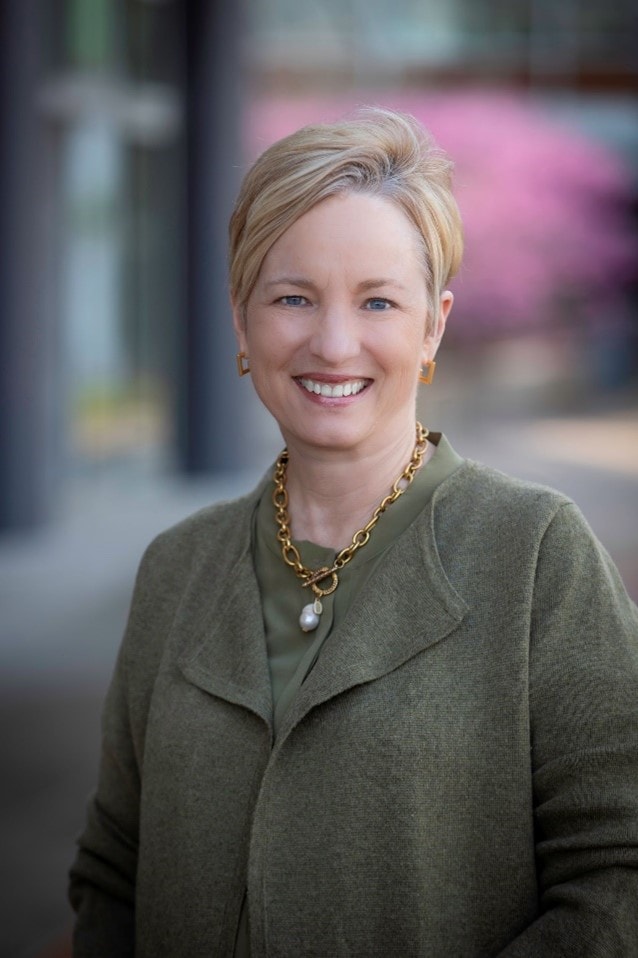
As principal investigator and director of the UAMS Translational Research Institute (TRI) and associate vice chancellor for Clinical and Translational Research, Laura James, M.D., is responsible for the overall administration and strategic development of the institute. She currently serves as the co-chair of the National Center for Advancing Translational Sciences Clinical and Translational Science Awards Program Steering Committee and is a board member of the Association for Clinical and Translational Science.
James is a professor of pediatrics at the UAMS College of Medicine and a faculty member in the Division of Clinical Pharmacology and Toxicology within the Section of Emergency Medicine at Arkansas Children’s Hospital.
She has extensive experience in clinical and translational research in NIH-supported research networks. Her research program in acetaminophen toxicity has been funded by the National Institute of Diabetes and Digestive and Kidney Diseases (NIDDK) since 1999. In 2006, she co-founded Acetaminophen Toxicity Diagnostics (ATD) LLC, to develop a novel laboratory test, AcetaSTAT, for the rapid detection of acetaminophen toxicity. This research is funded by the Small Business Technology Transfer program of NIDDK.
James was named an inaugural fellow of the Arkansas Research Alliance in 2014. She received her medical degree from the University of South Carolina and completed a pediatrics residency at UAMS. She completed fellowships in pediatric emergency medicine and pediatric pharmacology and toxicology at the University of Alabama at Birmingham and UAMS, respectively. She joined the faculty of UAMS in 1994.
John Arthur, M.D., Ph.D.
TRI Associate Director of Clinical and Translational Research, and K12 Program Co-Director
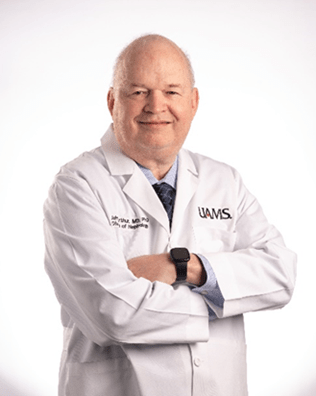
As associate director, John Arthur, M.D., Ph.D., is providing leadership on multiple fronts for TRI. He serves as the director for the K12 Scholars program, the institutional lead for the Trials Innovation Network (TIN) and is program faculty for the Health Sciences Innovation and Entrepreneurship (HSIE) training program. One of his major passions is promoting career development of junior faculty.
He is a practicing nephrologist with an interest in acute and chronic kidney disease. The research in his laboratory focuses on the pathophysiology of kidney diseases and the discovery and validation of biomarkers. He has been using proteomic technologies for discovery and validation of biomarkers for over 20 years.
Arthur is professor and chief of nephrology in the UAMS College of Medicine and also has an appointment at the Central Arkansas Veterans Healthcare System. He has an active VA research lab and is past chair of the Ralph H Johsnon VA Research and Development Committee and will serve an important role as liaison between the VA and TRI. He has expertise in building multidisciplinary teams and has a track record of research that blends basic science and clinical care.
Arthur created and led three multi-center consortia, including the NIH-supported Southern Acute Kidney Injury Network, which resulted in significant advances in the area of biomarkers of acute kidney injury. Since his arrival at UAMS in 2015, he has built a consortium of private practice and academic nephrologists interested in a broad array of kidney diseases.
Arthur received his medical degree and a doctorate in pharmacology from the University of Iowa. He completed an internal medicine residency followed by a research residency, both at Duke University. His residencies were followed by clinical nephrology and research in nephrology fellowships, also at Duke. He served on the faculty at the University of Louisville and the Medical University of South Carolina before coming to Little Rock.
Antiño R. Allen, Ph.D.
Associate Director of Diversity Initiatives, STARs Program
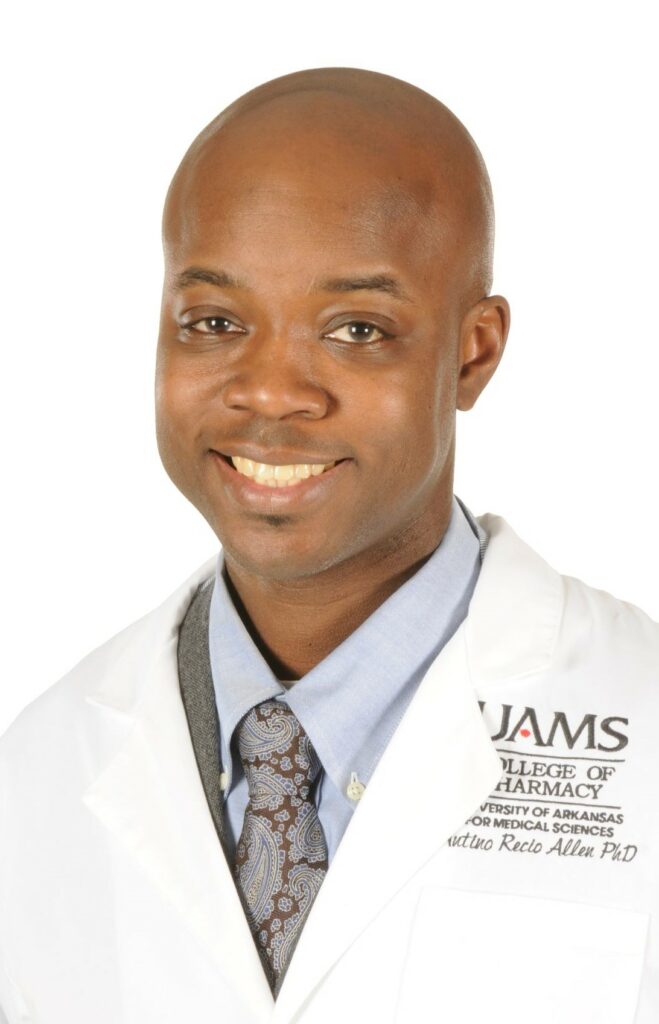
Antiño R. Allen, Ph.D., is associate director of Diversity Initiatives at TRI, where he directs the Strategies for Training and Advancing Underrepresented Researchers (STARs) Program, an effort to foster more research from underrepresented minority faculty. The program is a collaboration between TRI and the UAMS Division of Diversity, Equity and Inclusion.
He also oversees educational grant opportunities available through TRI’s Clinical and Translational Science Award funded by the National Center for Advancing Translational Sciences at the National Institutes of Health.
Allen is a professor in the UAMS College of Pharmacy and associate dean of Pipeline and Career Development at the Graduate School. He works with program directors at the Graduate School in pipeline and recruiting activities and coordinates all career development activities for currently enrolled students.
Allen earned his Bachelor of Science at Jackson State University and his master’s and PhD at Indiana University. He completed a post-doctoral fellowship at the University of California, San Francisco. He is also a veteran of the U.S. Army where he attained the rank of captain before returning to complete his PhD. He joined the College of Pharmacy in 2013 and has had extensive experience in mentoring graduate students, as well as undergraduate and high school students.
He has a robust neuroscience-based research program that has been continually funded by NIH and NASA. His laboratory is investigating molecular mechanisms and behavioral outcomes of chemotherapy treatment and radiation exposure.
Michael Birrer, M.D., Ph.D.
Liaison from the Winthrop P. Rockefeller Cancer Institute

Dr. Michael Birrer is the Director of the Winthrop P. Rockefeller Cancer Institute which is the only academic based cancer center in the state of Arkansas. He is a Vice Chancellor of UAMS and also serves as Director of the Cancer Service Line.
Dr. Birrer is recognized nationally and internationally as an expert in gynecologic oncology. He has published over 400 peer reviewed manuscripts and another 30 book chapters and review articles. He has served in leadership positions within the greater gynecologic oncology community. He has been the Chair and Chair Emeritus of the Department of Defense Ovarian Cancer Research Program, Chair of the Committee for Experimental Medicine of the Gynecologic Oncology Group, Chair of the Gynecologic Cancer Steering Committee and Chair of the Translational Science Working Group of the Gynecologic Cancer Intergroup. Dr. Birrer has been a member of the Society of Gynecologic Oncology, American Society of Clinical Oncologists, American Association of Cancer Research and the International Gynecologic Cancer Society. He has been on the program committees of ASCO, SGO and IGCS.
Birrer earned his undergraduate degree at Rensselaer Polytechnic Institute and graduated with a BS in Biology. He subsequently was accepted into the Medical Scientist Training Program at the Albert Einstein College of Medicine and completed his MD and PhD in 1982 with his principle area of study in microbiology and immunology.
Elisabet Børsheim, Ph.D.

K12 Program Co-Director
Elisabet Børsheim, Ph.D., is a Co-Director of the K12-program. She is a Professor in the Department of Pediatrics (primary) and Department of Geriatrics (secondary) at UAMS. She serves as the Director of the Physical Activity Core at the Arkansas Children’s Nutrition Center (ACNC), which is a national Human Nutrition Research Center supported by the USDA- Agricultural Research Service. Further, she is the Director of the Metabolism and Bioenergetics Core in the Center for Childhood Obesity Prevention at Arkansas Children’s Research Institute (ACRI) which is an NIH funded Center of Biological Research Excellence (COBRE), and the leader of the Physical Activity, Energetics and Metabolism Research Group at ACNC/ACRI.
The overall aim of Børsheim’s research is to promote metabolic health starting from the early life and across the lifespan. Her research program focuses on effects of nutrition and exercise on optimal growth, development and health in children and in the prevention of metabolic disorders later in life. Her team is using stable isotope methodology to study energy and substrate metabolism.
She has a B.Sc. in Natural Sciences and a M.Sc. in Physiology from the University of Oslo, Norway, in addition to a B.Sc. in Sport Sciences and a Ph.D. in Exercise Physiology from the Norwegian School of Sport Sciences. She did Postdoctoral training and continued as faculty at the University of Texas Medical Branch in Galveston, TX, before joining UAMS in 2013.

Mathias Brochhausen, Ph.D.
Community Engagement , Co-Director, K12 Mentored Research Career Development Award Program
Dr. Mathias Brochhausen is Professor & Vice-Chair for Academic Programs and Faculty Development. Dr. Brochhausen received a Ph.D. in Philosophy from the University of Mainz in Mainz, Germany, as well as a M.A. in Philosophy, Physical Anthropology, and Sociology. His current research interests include knowledge representation, biomedical vocabularies and ontologies, and semantic web technologies in biology and medicine
Keneshia Bryant-Moore, Ph.D., RN, FNP-BC

Community Engagement Core Associate Director
Keneshia Bryant-Moore, Ph.D., RN, FNP-BC, serves as an Associate Director of the Community Engagement Core of the UAMS Translational Research Institute (TRI). In this role she serves as a resource to researchers and community members and organizations interested in partnerships throughout the research process including the dissemination of research findings.
Bryant-Moore is the Assistant Dean for Diversity, Equity and Inclusion, and an Associate Professor at the University of Arkansas for Medical Sciences (UAMS) in the Fay W. Boozman College of Public Health. Presently, she serves as the Co-Director of the Community Engagement and Dissemination Core of the Arkansas Center for Health Disparities (ARCHD) which is funded by the National Institute of Minority Health and Health Disparities (NIMHD).
Bryant-Moore has been a nurse for over 20 years providing direct patient care, health education, program planning, and implementation. Her research primarily focuses on health disparities and inequities experienced by minority racial/ethnic groups and vulnerable populations. Also, to support long-term engagement in research with the faith community, she has been awarded several contracts from the Patient-Centered Outcomes Research Institute (PCORI) to support research dissemination, training, and platforms to generate new research ideas. Through these efforts, she has led the development of the Faith-Academic Initiative for Transforming Health (FAITH) Network. As part of this network faith leaders are educated on the basic principles of community-based participatory research and research ethics. The efforts of the FAITH Network are also supported by the TRI.
Bryant-Moore received her Bachelor of Science in Nursing and Bachelor of Science in Healthcare Administration from the University of Michigan-Flint; her Master of Science in Nursing from Duke University; and her PhD in Nursing from Azusa Pacific University. Bryant-Moore is a member of many professional organizations including Sigma Theta Tau International Nursing Honor Society, American Public Health Association; the Little Rock Black Nurses Association of Arkansas (LRBNAA); and she is a lifetime member of the National Black Nurses Association (NBNA).

Shelley Crary, M.D.
Co-Associate Director, Pilot Translational and Clinical Studies Program
Dr. Shelley Crary is a Pediatric Hematologist-Oncologist. Her primary clinical and research interests are focused on the care of children with bleeding or clotting disorders. She also has a strong interest in the hematologic aspects and medical management of complex vascular anomalies and works closely with the vascular anomalies multidisciplinary team at Arkansas Children’s. Dr. Crary also serves as a mentor in the Pediatric Hematology/Oncology Fellowship and Pediatric Residency Programs. She served as a Faculty Director for the Master of Science in Clinical and Translational Sciences (MS-CTS) Program.
Dr. Crary received her undergraduate degree in 1996 from Washington University in St. Louis, Missouri. She then attended medical school at Tulane University School of Medicine in New Orleans, Louisiana. She completed Pediatrics residency at Vanderbilt University in 2003 and Pediatric Hematology-Oncology fellowship at University of Texas Southwestern Medical School in Dallas, Texas, in 2006. She also obtained a Master’s Degree in Clinical Science in 2009 from UT Southwestern.
Geoffrey Curran, Ph.D.
Implementation Science Director
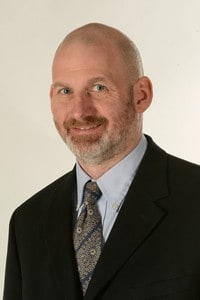
Geoffrey Curran, Ph.D., is a TRI program director and leads TRI’s efforts in implementation science.
Curran is director of the UAMS Center for Implementation Research and is professor of pharmacy practice (College of Pharmacy) and psychiatry (College of Medicine). He is also a research health scientist at Central Arkansas Veterans Healthcare System. He has served as principal investigator (PI) on numerous VA and National Institutes of Health (NIH)-funded implementation research projects, and he established the concept of the “hybrid effectiveness-implementation design,” now in broad use. He served as one of 10 national experts on the NIH Dissemination and Implementation Research Design and Methods Working Group with the goal of developing guidance and tools for selecting implementation research designs.
Since joining UAMS in 1999 he has been conducting mental health services research, with a focus on implementation research for the last 15+ years. He has studied and published manuscripts primarily on: 1) adaptation and implementation of evidence-based practices in a variety of clinical and community settings, and 2) the broader area of perceived need, treatment utilization, treatment retention, and outcomes in mental health/substance use disorders. The UAMS Center for Implementation Research’s mission is synergistic with the goals and activities of the TRI Implementation Science Optional Module. Curran teaches two graduate-level courses in implementation science and methods in the UAMS College of Public Health. He has experience establishing coalitions of partners to facilitate implementation research including the Federally Qualified Health Centers around Arkansas.
Curran earned his master’s and doctorate degrees in sociology from Rutgers University in New Brunswick, N.J.
Hari Eswaran, Ph.D.
Liaison from the Institute for Digital Health & Innovation

Hari Eswaran, Ph.D. is a standing member of Team Science group and in the leadership council at UAMS Translational Research Institute to help navigate the digital health portfolio.
He is currently a Professor and Director of Research with the Department of Obstetrics and Gynecology and the Institute for Digital Health & Innovation (IDHI), University of Arkansas for Medical Sciences (UAMS). He has a secondary appointment in Department of Biomedical Informatics. Currently, he leads the IDHI based South Central Telehealth Resource Center, one of just 14 federally-designated Telehealth Resource Centers located across the nation.
Funded by the National Institutes of Health (NIH) for the past 20 years, Eswaran’s area of research focuses on digital health and biomedical instrumentation with special emphasis on fetal and maternal monitoring during pregnancy. Over the years, he has undertaken several non-invasive fetal monitoring studies and has published over 100 papers in these areas. He has served on several NIH review panels and, at present, is a standing member of the NIH Biocomputing and Health Informatics panel. Dr. Eswaran has organized various workshops in schools of technology, medicine, and nursing including joint Indo-US telemedicine collaborations, some of which the former President of India, Dr. APJ Kalam, launched. He has been part of several Scientific Committees and Advisory Boards related to global and rural health programs including the national Society for Education and Advancement in Research in Connected Health (SEARCH). He an Interdisciplinary Research Fellow at a national leadership program supported by the Robert Wood Johnson Foundation (RWJF) to equip teams of researchers and on-the-ground change agents with advanced leadership skills and a clear focus on health and equity, allowing them to apply health research and policy to meet the pressing needs of communities.
Eswaran received the B.Sc. (Honors) Physics and M.Sc. (Electronics) degrees from the University of Delhi, India, M.S. (Physics) from the University of Mississippi and Ph.D. in Applied Sciences (Biomedical) from the University of Arkansas at Little Rock.
Brian Gittens, Ed.D., MPA
Vice Chancellor for Diversity, Equity and Inclusion; Associate Professor, Department of Health Policy and Management
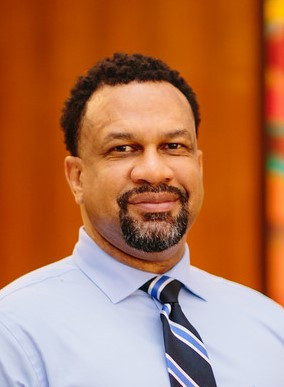
Dr. Brian Gittens specializes in organizational and leadership development, strategic diversity and inclusion, and change management. Brian is a diversity and inclusion executive, human resource professional, researcher, educator, and consultant with more than 30 years of operational and administrative experience. He has successfully led and collaborated on the design and implementation of organization-wide diversity and inclusion initiatives and organizational development programs.
Brian is a graduate of the George Washington University (EdD and Virginia Tech (B.A. Communications and Masters in Public Administration). He is a Certified Senior Professional of Human Resources and graduate of the AAMC Healthcare Executive Diversity and Inclusion Certificate program. He has held leadership roles at the University of Virginia School of Medicine and the School of Medicine and Public Health at UW-Madison. He is currently serving as the Vice Chancellor for Diversity, Equity, and Inclusion for the University of Arkansas for Medical Sciences.
Tiffany Haynes, Ph.D.
Community-Based Participatory Research

Tiffany Hayes, Ph.D. is a clinical psychologist with expertise in mental health services research, intervention development, and community-based participatory research (CBPR), serves as Director of TRI’s Community Engagement Core.
Haynes is an Associate Professor in the Department of Health Behavior and Health Education within the Fay W. Boozman College of Public Health. She has served as principal investigator on several National Institutes of Health (NIH) and Patient-Centered Outcome Research Institute (PCORI) funded grants that focus on the development of mental health interventions that can be utilized within community-based settings such as churches.
Currently, Haynes is the PI of a NIMHD-funded study that seeks to test the effectiveness of a faith-based depression intervention in partnership with 24 churches across Arkansas. Additionally, Haynes is a co-founder of the Arkansas FAITH Network, a coalition of places of worship, health care organizations, and health researchers, that partner together to reduce health disparities in Arkansas.
Dr. Haynes earner her master’s and doctorate degrees in clinical psychology from the University of Michigan in Ann Arbor, MI.
Anna Huff Davis
TRI Leadership Council Community Representative
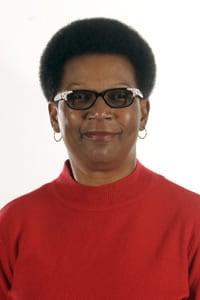
Anna Huff Davis has been a community research advocate providing training and partnering with researchers on multiple studies over the past 20 years. She has been a community liaison with the COPH’s Office of Community-Based Public Health since 2001. She served as a community partner on Arkansas’ Nutritional Intervention Research Initiative (NIRI) in the Mississippi River Delta funded by USDA and worked with Dr. Stewart to develop and implement community training on Community Based Participatory Research (CBPR) and the ethics of research for communities involved in NIRI. Since that time she has served as community deputy director of the Arkansas Prevention Research Center, as chair of the community advisory board for the TRI, as recruiter for the FRESH and REJOICE studies among many others. She has co-instructed the Community Scientist Academy (CSA) and serves as the primary facilitator for the Dos and Don’ts of Community Engagement workshop. She also serves as the chair of the board of the Arkansas Community Health Worker Association. As a life-long African American resident of Marvell, Arkansas in the Mississippi River Delta of Arkansas, she brings an invaluable community research partner’s perspective to the community engagement. She also co-instruct Community Based Public Health Program Design in the College of Public Health.
She received a degree in business administration from the University of Arkansas at Pine Bluff, certification for the Home Instruction for Parents of Preschool Youngsters (HIPPY) program at Hebrew University of Jerusalem, Israel, and has completed community-based education graduate coursework at the University of California, Davis.
Christopher Long, Ph.D.
TRI Evaluation

Christopher Long, Ph.D., is an assistant professor of psychiatry (College of Medicine) and Senior Director of Research and Evaluation for UAMS’s Office of Community Health and Research. Dr. Long has more than 20 years’ research and evaluation experience across the fields of health, psychology, consumer behavior, and education. He currently serves as PI on National Institutes of Health (NIH), United States Department of Agriculture (USDA), and foundation-funded projects focused on improving access to healthy food.
A primary focus of Long’s work is designing and implementing research studies and evaluations focused on multi-level primary and secondary prevention of diabetes in community-based settings, particularly among rural and urban food insecure or Pacific Islander communities. He has implemented and evaluated over 20 multi-level policy, systems, and environmental chronic-disease focused interventions, including the design and implementation of several randomized trial and natural experiment evaluations. He has served as lead evaluator for six CDC policy-focused food and built environment projects, including community-engaged projects based in schools, clinics, state parks, faith-based organizations, food banks, and food pantries. Long has also published extensively on ways to improve the process of sharing health research study results with study participants.
Long earned his master’s and doctorate degrees in psychology from the University of Massachusetts Amherst.
Pearl McElfish, Ph.D., MBA
Integrating Special Populations; Associate Director of Community Outreach and Engagement, Winthrop P. Rockefeller Cancer Institute
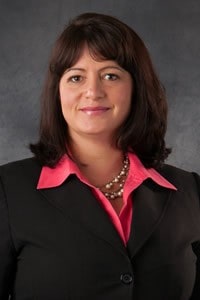
Pearl McElfish, Ph.D., MBA, serves as the Vice Chancellor for the University of Arkansas for Medical Sciences (UAMS) Northwest Regional Campus in Fayetteville, Arkansas, oversees the Office of Community Health and Research, serves as Director of the Center for Pacific Islander Health, and holds faculty positions in the UAMS Colleges of Medicine, Nursing, and Public Health. She is the founder of the Office of Community Health and Research at UAMS Northwest Regional Campus and of the Center for Pacific Islander Health at UAMS. Dr. McElfish leads the community outreach and engagement efforts for the Winthrop P. Rockefeller Cancer Institute.
Since late 2014, she has been awarded more than $70 million in federal and private foundation grants for investment in community health in Northwest Arkansas and published more than 150 peer-reviewed articles.
McElfish holds a PhD in public policy, a master’s degree in business administration, and a master’s degree in community and economic development. She is a certified Project Management Professional and a Certified Community Developer and has more than 15 years of experience working in health care administration and community health.
McElfish’s research focuses on reducing health disparities with Pacific Islander and Hispanic Communities. She also conducts food systems research and methodological research related to the best methods for conducting community-based participatory research and for disseminating research results to participants and communities. She has a history of funding from the Centers for Disease Control and Prevention (CDC), the Patient-Centered Outcomes Research Institute (PCORI), the National Institutes of Health (NIH), the United States Department of Agriculture (USDA), the Robert Wood Johnson Foundation, and other private foundations.
Jean McSweeney, Ph.D., RN
Liaison to Recruitment Innovation Centers
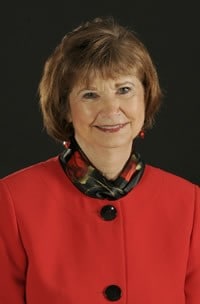
Jean McSweeney, Ph.D., oversaw development of and now directs the TRI’s state-wide participant research registry, ARreseaarch.org.
McSweeney recently retired from her positon as Associate Dean for Research and Professor and in the College of Nursing. She now holds the rank of Professor Emeritus. She is a research pioneer in the field of women’s cardiovascular disease and published the first study that described women’s symptoms of heart disease. Findings from her initial studies about women’s early warning and acute symptoms of heart disease across ethnic groups received national and international coverage from television and radio stations, such as CNN & CBS Evening News and newspapers including the New York Times and Chicago Tribune. She has presented her research findings to the National Heart Attack Alert Coordinating Board, served as a discussant for the National Institutes of Health (NIH) National Heart Lung, and Blood Institute’s Women’s Ischemia Taskforce, and was a featured speaker at the NIH National Institute of Nursing Research (NINR) 20th Anniversary Symposium. She has presented the National institute of Nursing Research, NIH, Director’s Lecture as well as many other invited lectureships. Nationally, she has served on the American Heart Association Research Committee, the National Institute of Nursing Advisory Council, and the National Institute of Health Council of Councils, NIH.
She has received funding for her research endeavors from the NINR, American Heart Association, Sigma Theta Tau International and the American Nurses Foundation. She has received continuous NINR funding since 1999. She has published in numerous nursing and medical journals including Circulation, the premier cardiovascular medical journal. Her research on women’s symptoms of heart disease have also been featured in a variety of women’s magazines and news journals such as Ladies Home Journal, Family Circle, Prevention, and U.S. News and World Report. She also served as the director of a NIH-funded P20 Center for Bio-behavioral Interventions in the College of Nursing.
McSweeney is the recipient of many awards including the American Heart Association (AHA) “Manuscript of the Year” Award, the UAMS Chancellor’s University Graduate Teaching Award, the AHA “Best Abstract Award,” and the Southern Nursing Research Society “Leadership in Research” Award, the AHA Lembright Award and the AHA Volunteer for the Year Award. She is recognized as a Distinguished Alumni of the University of Texas at Austin School of Nursing and of the University of Texas at Arlington. She is a Fellow in both the AHA and the American Academy of Nursing.
McSweeney received her baccalaureate in nursing from Cameron University in Lawton, Okla., her master’s in nursing from the University of Texas at Arlington, and her Ph.D. from the University of Texas at Austin. She belongs to many professional organizations including American Nurses Association, Sigma Theta Tau Nursing Honor Society, and Phi Kappa Phi Honor Society, and the American Heart Association Council of Cardiovascular Nursing. She is a long-standing member and past president of Southern Nursing Research Society. She is one of four nurses who serve on the NIH National Institute of Nursing Research Advisory Council. She was recently appointed to the NIH Council of Councils that advises the NIH director. She is a fellow in both the American Heart Association and the American Academy of Nursing.
Donald M. Mock, M.D., Ph.D.
Pilot Program Director and Mock Study Section Co-Director
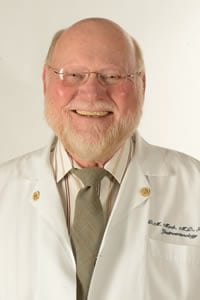
Donald Mock, Ph.D., is a professor of biochemistry and molecular biology, as well as pediatrics, and has been continuously funded by the National Institutes of Health (NIH) since 1984.(Does CTSA funding count?) He has published 147 peer-reviewed manuscripts and dozens of book chapters, reviews, and solicited commentaries. He is principal investigator on a completed NIH R37 (year 28), founder/project director/core lab director for the first 25 years of an ongoing program project grant (P01), and the leader of the team that discovered and characterized the original cases of biotin deficiency during total parenteral alimentation (providing nourishment intravenously) and of inborn (genetically determined) biotin transporter deficiency.
During his leadership of long-standing National Heart, Lung, and Blood Institute funded research, he has applied his knowledge in the area of biotinylation of red cells for use in red blood cell (RBC) kinetic studies of relevance to neonatal transfusion medicine. Mock’s broad background (spanning physics, biochemistry, nutrition, pediatrics, gastroenterology, and clinical research including regulatory affairs – as principal investigator, administrator and research subjects advocate) has enabled an effective application of basic and clinical science to solve problems in designing and implementing studies in individuals who age covers the entire lifespan. He has been recognized by several research and teaching awards, including the Deans Distinguished Faculty Scholar in 2014.
Mock has served on 34 extramural grant peer review panels, including 28 NIH regular or ad hoc panels; Dr. Mock served as program director for the USDA Competitive Program in Human Nutrient Requirements.
He received his medical degree from Southwestern Medical School in Dallas and completed his pediatric residency at Children’s Medical Center in Dallas. He received a doctorate in biochemistry from the University of Texas Health Science Center in Dallas, and he completed fellowships in pediatric gastroenterology and nutrition and clinical research at the University of California, San Francisco.
Fred Prior, Ph.D.
Biomedical Informatics

Fred Prior, Ph.D., is a TRI program director and leads TRI’s Comprehensive Informatics Resource Center (CIRC), overseeing all biomedical informatics efforts for TRI.
He is a professor and the inaugural chair of the Department of Biomedical Informatics, and professor of Radiology in the UAMS College of Medicine. He has extensive research and development (R&D) experience in industry and academia focused on the design of advanced medical information management and imaging technologies. He has held senior management positions in a variety of R&D environments ranging from Silicon Valley startups to major multi-national corporations in the United States and Europe.
Prior’s research interests include cancer and neuro imaging informatics, radiomics, open access data publication and applications of distributed machine learning. He serves as principle investigator and director of the National Cancer Institute’s Cancer Imaging Archive project and is the lead PI of an NCI ITCR team exploring the integration of radiomics and pathomics. Recently Prior’s team joined a consortium of European colleagues to successfully compete for a Horizon 2020 award from the EU to develop a platform for distributed data management and machine learning to advance precision medicine in oncology.
Dr. Prior is an editorial board member for Nature Scientific Data and an associate editor of several other leading scientific journals. He serves as a reviewer for numerous scientific and engineering journals as well as U.S. and European funding agencies. He is the author of over 100 scientific publications and holds seven U.S. and international patents.
Paula Roberson, Ph.D.
Biostatistics, Epidemiology, and Research Design (BERD)
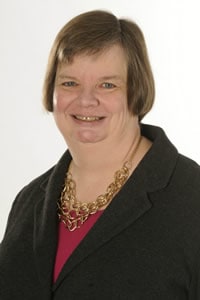
Paula Roberson, Ph.D., leader of TRI’s Biostatistics, Epidemiology and Research Design (BERD) function, is professor and chair of the UAMS Department of Biostatistics, which is jointly administered by the Colleges of Medicine and Public Health. She is an active participant in the Association of Clinical and Translational Statisticians and in the BERD Special Interest Group of the Association for Clinical and Translational Science. In addition to her role on the TRI, she is the interim director of the Biostatistics Core for the Center for Childhood Obesity Prevention (supported by a COBRE award from NIGMS) and a co-investigator and co-leader of the Clinical Trials Skills Development Core for the Data Coordinating and Operations Center of the IDeA States Pediatrics Clinical Trials Network, funded through the NIH Director’s Office.
An elected fellow of the American Statistical Association (ASA) and of the American Association for the Advancement of Science (AAAS), Roberson is a recognized leader in biostatistical aspects of the design, conduct and analysis of biomedical research. A frequent reviewer for the National Institutes of Health, she has served as a standing member on both the Clinical Oncology Study Section (CONC) and the National Heart, Lung, and Blood Institute (NHLBI) Clinical Trials Review Committee. She was a member of the NHLBI appointed Data Safety Monitoring Boards for the Stroke with Transfusions Changing to Hydroxyurea (SWiTCH) Trial, the Transfusion Medicine/Hemostasis Clinical Trial Network (TMH CTN), and the Transfusion Trigger Trial for Functional Outcomes in Cardiovascular Patients Undergoing Surgical Hip Fracture Repair (FOCUS). She served as the chair of the protocol review committee for the NHLBI Chronic Hypertension and Pregnancy (CHAP) trial, and is a member of the DSMB for CHAP as well as an NHLBI-appointed DSMB for a trial to compare individualized vs weight based protocols to treat vaso-occlusive episodes in sickle cell disease (COMPARE VOE). She was the 2015 president of the Caucus for Women in Statistics and served on the ASA Board of Directors during 2016-2018. She is a member of the Statistical Advisory Board for the online journal PLoS ONE.
Roberson earned her doctorate in biomathematics from the University of Washington in Seattle. Prior to joining UAMS in 1993, she held positions with the Health Effects Research Laboratory of the Environmental Protection Agency in Cincinnati, Ohio, and with St. Jude Children’s Research Hospital in Memphis, Tenn.
Nancy Rusch, Ph.D.
Translational Workforce Development and TL1 Heath Sciences Innovation and Entrepreneurship Training Program Co-Director

Nancy J. Rusch, Ph.D., co-directs the NRSA Training Core that includes the Health Science Innovation and Entrepreneurship (HSIE) postdoctoral training program. She also directs workforce development efforts for the TRI by developing structured career pathways for clinical and translational research professionals and identifying opportunities across the CTSA hub to expand clinical and translational research and improve extramural funding.
Rusch is professor and chair of the Department of Pharmacology and Toxicology in the College of Medicine, a position she has held since 2005. Her research focuses on ion channel mechanisms of hypertension and identifying antihypertensive drug targets. She has been funded by the National Institutes of Health (NIH), American Heart Association (AHA) and other funding sources for 30 years. Her leadership positions including chairing multiple NIH study sections and review groups, serving on the Southwest Affiliate Board of Directors of the American Heart Association, and serving as president of the Cardiovascular Division of the American Society for Pharmacology and Experimental Therapeutics.
Rusch has served as primary mentor to more than 40 undergraduate and graduate students, fellows and visiting faculty, most of whom applied for and obtained extramural grants to support their training. She was awarded the Chancellor’s Faculty Teaching award in 2009 and named Graduate Faculty Member of the Year by the UAMS Graduate School in 2014 to recognize her successful mentoring of research trainees. In 2020, she was awarded the Educational Innovation Award by the College of Medicine for developing and co-directing the Health Science Innovation and Entrepreneurship postdoctoral training grant, which is funded by the CTSA grant awarded to the TRI.
Kevin Sexton, M.D.
TL1 Heath Sciences Innovation and Entrepreneurship Training Program Co-Director
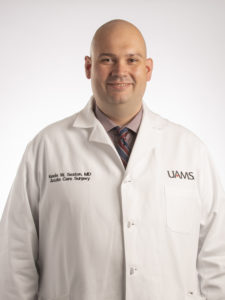
Kevin Sexton, M.D., is an Associate Professor in the Department of Surgery with secondary appointments in the Department of Biomedical Informatics, the Department of Health Policy and Management, and the Department of Pharmacy Practice, Division of Pharmaceutical Evaluation and Policy at the University of Arkansas for Medical Sciences (UAMS). He is an acute care surgeon-scientist with board certifications in Surgery and Clinical Informatics. He completed postdoctoral training in biomedical informatics, surgical quality, signal processing, and software development.
Dr. Sexton’s research focuses on surgical outcomes in acute care surgery, where he uses data and digital tools to create signal processing software to predict clinical deterioration. He has used this expertise to create software that worked across multiple electronic medical records to predict patient complications in hospital and outpatient settings (Midas+ Live™). Furthermore, he has used these skills to patent technologies for monitoring patients. This experience led to his current position as Associate Director of Translational Workforce Development and my current roles as interim Director of BioVentures, LLC, Associate Chief Clinical Informatics Officer for Innovation, Research, and Entrepreneurship and Associate Director of the University of Arkansas for Medical Sciences (UAMS) Institute for Digital Health & Innovation.
Jessica Snowden, M.D., M.S., MHPTT
Translational Workforce Development

Jessica Snowden, MD, MS, MHPTT, is a Professor of Pediatrics and Chief of the Division of Pediatric Infectious Disease at the University of Arkansas for Medical Sciences in Little Rock, Arkansas. She is the Vice Chair for Research in the Department of Pediatrics and Associate Director of Clinical and Translational Research at Arkansas Children’s Research Institute. She is the co-Principal Investigator of the IDeA States Pediatric Clinical Trial Network’s Data Coordinating and Operations Center, directing clinical operations for trial implementation and professional development across a 18-state NIH funded research group. She also has an active, NIH-funded basic science laboratory studying the role of age on the immune responses and neurologic outcomes following infections in the brain, so that we might design improved prevention and treatment strategies for these infections. She holds the Horace C. Cabe Endowed Chair in Pediatric Infectious Disease. In addition to her basic science and clinical research, she has a long history of active involvement in medical student, resident, and fellow education and multiple teaching awards. She has been recognized as a Fellow of the American Academy of Pediatrics (FAAP), Fellow of the Pediatric Infectious Disease Society (FPIDS), and Fellow of the Infectious Disease Society of America (FIDSA) and is a member of several national committees focused on medical research.
Dr. Snowden received her medical degree from Texas A&M Health Science Center in 2002. She completed her pediatric residency and chief residency at East Carolina University / Pitt County Memorial Hospital before going on to Pediatric Infectious Disease fellowship at Arkansas Children’s Hospital / University of Arkansas for Medical Sciences from 2006-2009.
Mary Kathryn (Kate) Stewart, M.D., MPH
Community Engagement

Mary Kathryn “Kate” Stewart, M.D., M.P.H., directs TRI’s Community Engagement program. In this capacity she oversees activities fostering collaboration and partnerships involving community members and organizations, patients and families, and clinician stakeholders to address health issues that are vital to translational research.
Stewart, a professor of health policy and management in the UAM Fay W. Boozman College of Public Health (COPH), directs the Office of Community-Based Public Health and leads the community engagement efforts of the Arkansas Center for Health Disparities and the Arkansas Prevention Research Center at COPH. Through these leadership roles she has partnered with communities to create infrastructure for community-engaged research with support from the National Institutes of Health, federal Centers for Disease Control and Prevention, federal Health Resources and Services Administration, the U.S. Department of Agriculture, Centers for Medicare and Medicaid Services, and the Robert Wood Johnson Foundation. She has more than 30 years of experience engaging communities, both domestically and internationally, in research and interdisciplinary efforts to improve public health. Her efforts have led to policy changes related to access to care, community health workers, and long-term care.
Stewart earned her medical degree from UAMS and obtained a Master of Public Health with a concentration in international health from Johns Hopkins University in Baltimore. Her postgraduate training included an internship in family medicine at the University of Missouri in Kansas City, and a residency in preventive medicine and a fellowship in health and child survival, both from Johns Hopkins. Prior to joining the UAMS faculty in 1997, she spent nearly a decade working internationally in the Matlab Maternal and Child Health and Family Program in Bangladesh and for the Demographic and Health Surveys Program in Namibia, the Philippines and Ethiopia.
